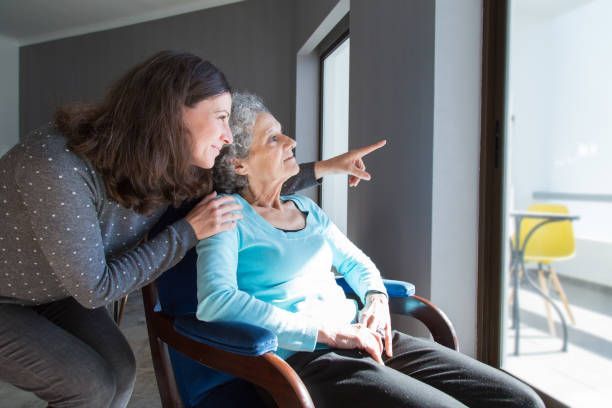Navigating Family Caregiving: Spouse Caregiver Resentment and Burnout
Navigating Family Caregiving:
Spouse Caregiver Resentment and Burnout
At 7 Day Home Care, we recognize that spouse and family caregivers often experience significant burnout while caring for their loved ones, especially when managing the demanding needs of individuals with chronic illnesses, Alzheimer’s, or dementia. The emotional and physical toll of caregiving can lead to exhaustion, stress, and even feelings of resentment, which can compromise both the caregiver's well-being and the quality of care provided. Without adequate support, caregivers may struggle to maintain their own health, balance other family responsibilities, or even find time for personal rest. To address this, 7 Day Home Care offers compassionate respite care services, designed to give family caregivers the essential breaks they need, while ensuring that their loved ones continue to receive high-quality, personalized care. By providing professional, reliable support, we help prevent caregiver burnout, enabling families to sustain their caregiving roles while maintaining their own health and emotional stability. 7 Day Home Care is licensed by the New York State Department of Health to provide home care services in
Manhattan, Queens, Brooklyn, Nassau County, and Suffolk County, New York.

Risks and Practical Strategies to Overcome Caregiver Resentment and Burnout
Family caregiving is a deeply rewarding but demanding role that involves providing essential care and support to loved ones with varying medical conditions. At 7 Day Home Care, we recognize the challenges faced by family caregivers, particularly when caregiving responsibilities extend to spouses. In this article, we will explore the complexities of family caregiving, discuss the concept of caregiver resentment and spouse caregiver burnout, highlight some risks involved, and provide practical strategies to overcome these issues.
The Challenges of Family Caregiving
- Emotional Strain: Family caregivers often experience emotional stress due to witnessing their loved ones' physical or cognitive decline. The emotional toll can lead to feelings of helplessness, anxiety, and sadness.
- Physical Demands: The physical demands of caregiving can be physically taxing, especially when caring for individuals with mobility limitations or chronic health conditions. According to a report by the National Alliance for Caregiving and the AARP, family caregivers spend an average of 24.4 hours per week providing care.
- Financial Burden: Family caregivers often incur additional expenses related to medical supplies, transportation, and home modifications. Balancing these financial burdens can lead to stress and strain on the caregiver's resources.
Practical Strategies for Overcoming Caregiver Challenges
- Seek Support: Reach out to support groups, community resources, and online forums that cater to family caregivers. Connecting with others who understand the caregiving journey can offer emotional support and practical advice. The Family Caregiver Alliance provides resources and support for family caregivers nationwide.
- Practice Self-Care: Take time for self-care and prioritize personal well-being. Engage in activities that bring joy and relaxation, and don't hesitate to ask for assistance from friends or family members. According to a study published in the Journal of Applied Gerontology, self-care practices can significantly reduce caregiver burden and improve overall well-being.
Caregiver Resentment and Spouse Caregiver Burnout
- Caregiver Resentment: Caregiver resentment can occur when family caregivers feel overwhelmed, underappreciated, or taken for granted. It may manifest as frustration or anger towards the caregiving responsibilities. The Cleveland Clinic states that caregiver resentment is a common emotional response to the stress of caregiving.
Spouse Caregiver Burnout: Spouse caregivers, in particular, may experience burnout due to the emotional strain of seeing their partners in distress. The continuous caregiving responsibilities can lead to exhaustion and neglect of personal needs. The National Institute on Aging highlights that spouse caregivers are at an increased risk of experiencing burnout due to the intensity of their caregiving role.
Risks and Strategies for Overcoming Caregiver Resentment
and Spouse Caregiver Burnout
- Risk of Compromised Mental Health: Caregiver resentment and spouse caregiver burnout can negatively impact the caregiver's mental health, leading to increased rates of anxiety and depression.
- Impact on Caregiving Quality: When caregivers experience resentment or burnout, it may affect the quality of care provided to their loved ones. This can result in suboptimal care and emotional distance between the caregiver and care recipient.
Practical Strategies for Overcoming Caregiver Resentment
and Spouse Caregiver Burnout
- Establish Clear Communication: Openly communicate feelings and concerns with family members or a support group. Honest conversations can help address issues and provide solutions.
- Share Responsibilities: Involve other family members or hire professional in-home care services to share caregiving responsibilities. Delegating tasks can alleviate caregiver burden and promote better self-care.
- The National Alliance for Caregiving and the AARP report that caregivers who receive assistance from others experience lower levels of emotional stress.
- Take Breaks: Take regular breaks from caregiving to rest and recharge. Respite care services provide short-term relief and allow caregivers to focus on their well-being. The Mayo Clinic recommends respite care as a vital tool for preventing caregiver burnout.
Family caregiving is a meaningful yet challenging role that requires ongoing support and understanding. Caregiver resentment and spouse caregiver burnout are common emotional responses to the stress of caregiving. However, with the implementation of practical strategies and seeking support, caregivers can better navigate the challenges and maintain their well-being. At 7 Day Home Care, we provide compassionate in-home care services in Manhattan, Brooklyn, Queens, Nassau County, and Suffolk County, New York, to support both caregivers and their loved ones throughout their caregiving journey.
To learn more about our in-home care services and support for family caregivers, visit us here or call 516-408-0034. We are dedicated to improving the lives of our clients and their families, ensuring a balanced and fulfilling caregiving experience.
Brian Callahan
7 Day Home Care










